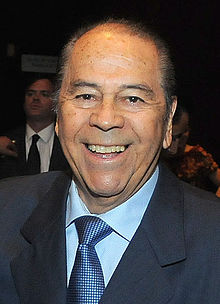User:Lanetajefa/sandbox
This article has multiple issues. Please help improve it or discuss these issues on the talk page. (Learn how and when to remove these messages)
|
Lucho Gatica | |
|---|---|
 Gatica in 2011 | |
| Born | Luis Enrique Gatica Silva 11 August 1928 |
| Died | 13 November 2018 (aged 90) |
Luis Enrique Gatica Silva (11 August 1928 – 13 November 2018),[1] better known as Lucho Gatica was a Chilean bolero singer, film actor, and television host known as "the King of Bolero". He is widely considered one of the greatest and most influential exponents of the bolero and one of the most popular of all time worldwide.[2] It is estimated that Gatica released more than 90 recordings. He toured across the world, performing in Europe, the Middle East and Asia. He was the uncle of the record producer Humberto Gatica.
Biography
[edit]Lucho Gatica was born in Rancagua. He attended school at the Instituto O'Higgins. He and his brother Arturo were struggling singers before they released their first album in 1949, when Gatica was 21 years old.
Chileans generally experienced a change in their taste in music during the 1950s, when the bolero overtook the tango as Chileans' preferred music genre.[citation needed] Singers like Cuba's Olga Guillot, Argentinian Leo Marini and Mexican Elvira Ríos, among others, became popular during that time. So were Xavier Cugat and his orchestra, which included Puerto Rican Bobby Capó. These singers would influence Gatica.[citation needed]
Gatica's first record, 1951's "Me importas tú" (You Matter to Me), became a hit across Latin America. The next year he released "Contigo en la distancia" (With You in the Distance). Gatica recorded his version of Consuelo Velázquez's "Bésame Mucho" (Kiss Me a Lot) in 1953. He produced two more albums that year: Las Muchachas de la Plaza España (The Girls from Spain Square) and Sinceridad (Sincerity). The following year his hit "Sinceridad" was released.[3]
Gatica moved to Mexico in 1957, where he recorded and released No me platiques más (Don't Talk to me Anymore), Tú me acostumbraste (You Accustomed Me) and Voy a apagar la Luz (I'm Turning the Lights Off), which was released in 1959. In 1956, Gatica's songs were recorded in the United States on LP for the first time by Capitol Records. Three albums were released within 14 months by Capitol. The third one in that group with Capitol was El Gran Gatica, which featured such songs as "Somos" ("We Are"), "Sabrá Dios" ("God Will Know"), and Si me comprendieras ("If You Understood Me"). One of the three Gatica albums released in 1958 was a greatest hits compilation; the third was named Envenenados (The Poisoned). He also recorded a song entitled "Encadenados" (Chained).
After arriving in Mexico, Gatica decided to become a permanent resident there. He married Puerto Rican actress Mapita Cortés, who also resided in Mexico. The couple had two sons named Luis and Alfredo. Gatica became a telenovela and rock star during the 1980s; his son Alfredo became a music entrepreneur. Gatica divorced Cortés in 1981. The following year he married Diane Lane Schmidt and had a daughter named Lily; Schmidt died in 1985. He then married his last wife, Leslie Deeb, in 1986.[citation needed] Altogether he had seven children.[citation needed]
In 2001, Gatica was inducted into the International Latin Music Hall of Fame.[4] In the same year, his renditions of "La Barca" and "El Reloj" were inducted into the Latin Grammy Hall of Fame.[5] Gatica himself was one of the recipients of the Latin Grammy Lifetime Achievement Award in 2007.[6] He also received a star on the Hollywood Walk of Fame for Recording in 2008.[7]
Gatica died in Mexico on 13 November 2018 from pneumonia.[1]
See also
[edit]References
[edit]- ^ a b Lucho Gatica, ‘the King of Bolero,’ Is Dead at 90: The New York Times. Retrieved 10 December 2018.
- ^ "♫ LUCHO GATICA: LA MUERTE DEL MEJOR CANTANTE DE BOLEROS DEL MUNDO | PyD". 14 November 2018.
- ^ Harris, Craig. "Biography: Lucho Gatica". AllMusic. Retrieved 25 May 2010.
- ^ "International Latin Music Hall of Fame Announces Inductees for 2001". 3 April 2001. Archived from the original on 7 November 2017. Retrieved 31 October 2015.
- ^ Margulies, Lee (28 August 2001). "Latin Grammy Names Its First Hall of Famers". Los Angeles Times. Retrieved 10 June 2016.
- ^ "Alberto Cortez, Lucho Gatica, Olga Guillot, Los Tigres del Norte, Os Paralamas do Sucesso and Chavela Vargas to Receive the 2007 Latin Recording Academy® Lifetime Achievement Award". Terra Networks. 17 September 2007. Retrieved 19 February 2016.
- ^ "Ricky Shows His Bum-Bum!". People en Español. 28 January 2008. Retrieved 23 November 2018.
External links
[edit]
